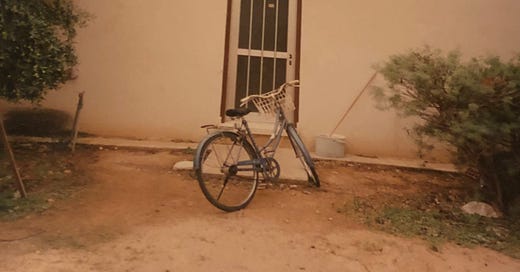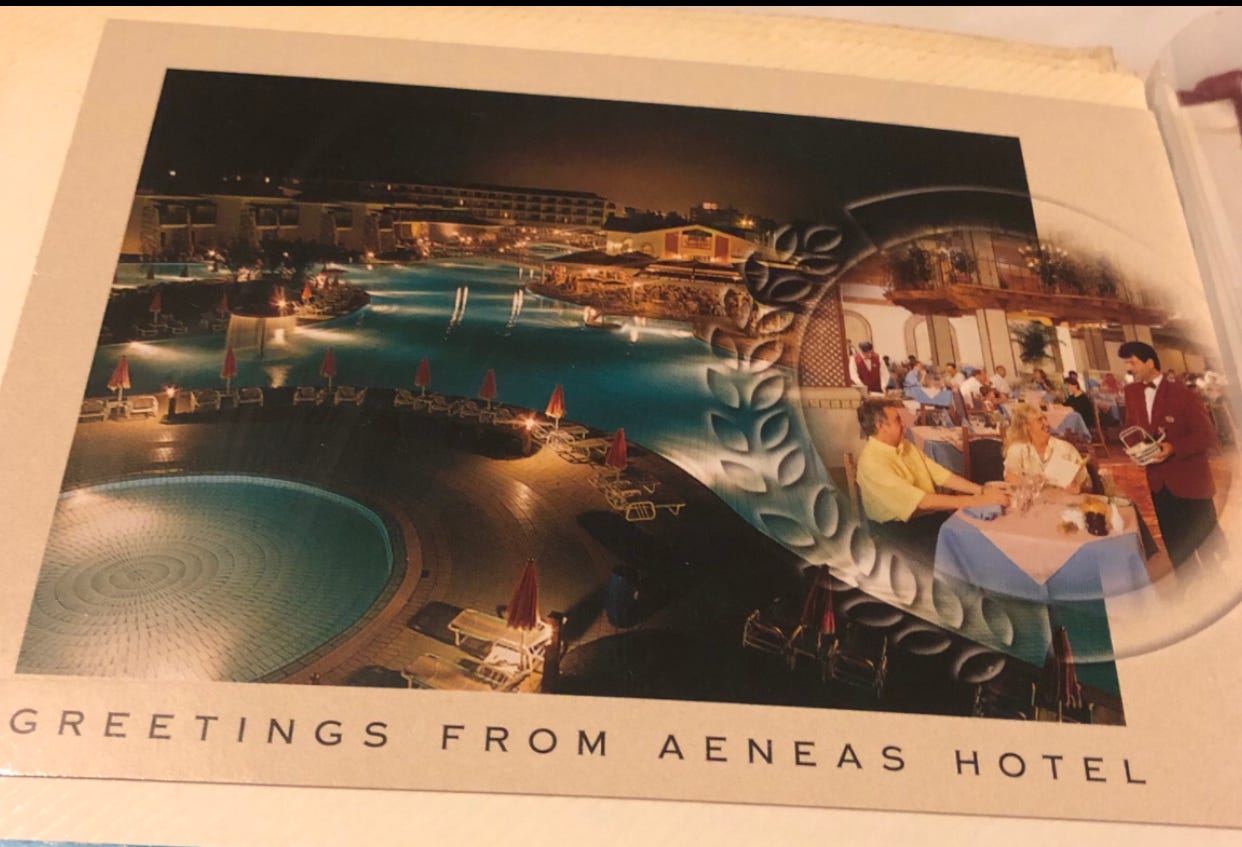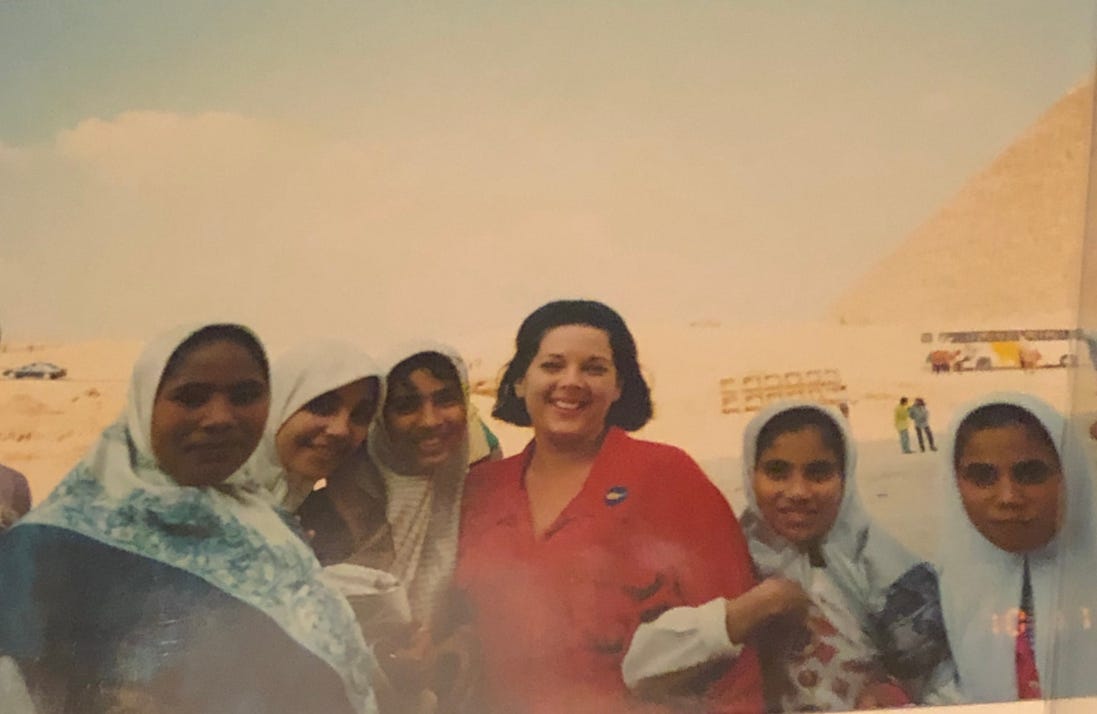August 1997, Ayia Napa, Cyprus
Every morning, six days a week, I ride my pale blue bicycle up the wide, hotel-fringed road to the one I work at, the Aeneas.
A display of flags - presumably to lend an illusion of grandeur - announce a low rise sprawl the colour of poached salmon and buttered popcorn. Sliding french doors in each guest room give way to a private slice of pool, the rose lipped tiles of each structure quenched by their own bespoke azure.
I can’t remember why, but today I am out and about early. It’s dark and there is barely anyone around.
On my pleasant commute, I nip into a small convenience store to buy a bottle of water or can of pop. It’s an establishment I know well. They are used to me here; by evening, buying bottles of Mad Dog 20/20 or Hooch, and by day purchasing ice lollies, pitta bread or pasta.
The diet of a 23 year old living alone in a party town fluctuates between alcohol, quick sugar fixes and bouts of guilt in which I mother myself, forcing irresponsible me to make a ‘proper’ meal.
“Kaliméra” I utter, as I near the counter. I know about five words in Greek and this is one of them.
Immediately, I notice something isn’t right with the shop keeper. Cyprus is a land in which middle aged men have a certain face reserved for young English women. It’s the look that tastes of the sugared yellow grapefruits my grandma used to give me as a child. A bitter sweet cocktail in turmoil with itself over whether to hate me for soiling the culture of his homeland with my youthful rambunctiousness, whilst simultaneously quite liking the money ‘my kind’ bring in, perhaps wanting to sleep with me and praising god his own daughter is not like me. It is literally a smile through gritted teeth.
Today the proprietor has no such expression.
His beast of burden eyes ferry fog and each sullen cheek seems in tug of war with the other. He is listening to the radio.
“Princess Diana”
He mumbles.
Don’t much like her, I think. Attention seeking clothes horse who flounces around the world leaving her kids, hogging media limelight whilst telling people to leave her alone. Not my bag, as they say.
I am unprepared for his next word.
“Dead”
A brief conversation ensues in which he tries to convey in broken English what his Cypriot radio station is saying. He listens with the concentration of a child in a spelling test, his head leaning in, as if that somehow adds clarity to the words he hears.
“Accident” he mutters. I try to ask more but with each question, he shrugs. Maybe the official story is not yet clear or perhaps his limited English obstructs his ability to tell me. No newspapers have yet been delivered, so until I reach the hotel, there is no way of finding out much more. I offer a strained sliver of a smile and leave.
I arrive at work and the atmosphere, usually a chaotic yet happy stew of holiday cheer, is sombre and tense. Absorbing this kind of news in the UK is somehow in-keeping with the national character of tea and drizzle. Britain, with its grey mouse alleys that smudge into cloudy skies as badly erased pencil sketches, is perfect for digesting death.
Cyprus is not. Its blinding light and scorched terracotta earth are not mindful of grief. They mock mourning the way a pretty lace handkerchief antagonises the tears it mops. One cannot skulk so easily beneath a dazzling sun, for it does not share your condolences.
The hotel, a merry legged Club Tropicana of a place, clearly does not know how to handle this. On the one hand, people have paid for a holiday and expect to enjoy themselves. On the other, they have a duty to respect the deep affection many hold for the Princess.
A solution is quickly offered up in the form of a dark room. A large area is curtained off and a pick n mix hobble of chairs set around it. It looks like a nursing home lounge that has reluctantly accepted its residents’ death warrants, rather than the usual forced cheer of pot pourri, sunny window sills and dried flower arrangements.
At one end of the room, a television has been wheeled in upon a high stand. It’s the kind we had at school when we watched ‘Words and Pictures’ in the library. The long metal legs with their sheen, impose upon the frowning space like an awkward gangly teenager.
The channel is set to BBC1 which has naturally stepped up as head boy to bring a barrage of bleakfest to anyone who wants it. Commentators set out the stall as depressed pigeons delivering wall to wall poundshop poignancy from a listless line up of leaden lips.
Guests begin to flock to this room as they hear the news. Everyone wants to know more about what happened. Disbelief is strong. “But….she was so young” is an oft repeated phrase.
It turns out to be a dismal sack of potatoes of a day. With all my emotional might, I drag myself through my shift not quite knowing how to act.
What is my role today? Am I still entertainer or is my job to absorb pain and offer sympathetic ear?
My fellow Brits have morphed into a species I don’t quite recognise. Every expression of concern I muster seems to evolve into a dark piss-take.
I cannot fake what I do not feel and I did not like the woman.
Not only that, I find it incredibly odd that people can grieve for those they don’t personally know. To me, It illustrates the power of the mind and how attachments can be formed with no real basis of love, only what someone chooses to believe. The bond these people have convinced themselves they experienced with Diana evokes the connection a young teenager may feel when a pop star sings ‘to only her’ on a video.
I’ve always had the unfortunate habit of giggling when I shouldn’t. Nerves wrestle through me as sniggers and smiles. I can’t help it. For this reason I decide to try and avoid eye contact as I know it will set me off and I don’t want people to misunderstand my social anxiety.
I decide that when I finish my shift, I will go round and see my mate George. He’s my gay best friend and works with me at the hotel as an animator. I’m convinced he will ‘get it’ and intend getting a much needed dollop of common sense.
Alas, no.
I arrive at George’s flat, just a few doors down from my own, to find him pinning various newspaper and magazine cuttings to the wall. He appears to be making the room into a shrine to her.
I have to be direct with him.
“George, fucks sake, this is creepy. She was a stranger to you! You’re mad doing all this shit. Sticking pictures on your wall! Why? Do you think she would give a fuck if you’d died?”
“It’s not about that!” he tells me. His eyes throwing the wounded shapes of drama only a ‘friend of Dorothy’ can.
I roll my eyes. I should’ve guessed, after all she was known for all her involvement with the gay community and AIDS awareness.
George lives up to the stereotype and tells me that Diana was different to other royals, was badly treated by Charles…. and besides, he liked her dresses….
Bloody hell, is there any escape from this madness?
A week later I am relieved to find myself in Egypt. The crazy of Cairo seems a world away from Brit stuffed Ayia Napa.
I take the air conditioned coach to visit the pyramids. It’s my first time in Africa and I embrace the chaos of all I see, like a flickering movie. Traffic weaves as a flurry of dancing silk scarves; colourful and disobedient. Dirt flies up from dust bowl roads to chalk cough-inducing smirks upon sedate air.
Frazzled looking tour guides compete for attention with persistent pneumatic drills. Skinny cattle are shoehorned into open trucks with drowsy glockenspiel ribbed sheep. Are they even sheep? I wonder. I’ve never seen sheep so bony anywhere else. The eyes of the animals tell of their plight. There is no fight, only a smoked glaze of resignation.
Finally we reach the pyramids. No sooner as we disband the coach, a group of native girls around 13 years of age approach me. Their manner is solemn, heads bowed.
One of them raises her face to address me. I try and anticipate what her message might be for her face to hold such seriousness.
Then finally, the words arrive.
“We are all so sorry to hear about Princess Diana.”
Know what? I’m done







Evocative stuff. You conjure up the dry heat and bougainvillea. Apparently, there was a 17% rise in suicide following Diana’s death (there’s an occult number we don’t seem to be able to escape from) and a rise in self harm of over 40%. As a young community psychiatric nurse working in Bradford at the time, I can’t say I noticed in particular. I do wonder how much impact there would have been without the media fuelling it - yet there was some collective weirdness going on at the time. We didn’t have the term “virtue signalling” back then to label it thus, but I also recall a widespread judgemental scrutiny of how appropriately public figures were or weren’t handling their responses. The whole thing was like a practice run for social media.
I totally agree with the concept of wonderment over how some can mourn over someone they never knew personally. I remember watching with fascination the tributes and the shrines.
Today here in the US we have the flags at half mast. My initial reaction was’why’. We didn’t lose our queen. Yet people are speaking of her as though they knew her well and love her. I just don’t get it.
I always wondered how people can love a monarch. Or how people can deify elected officials. I’m done too. 🫥